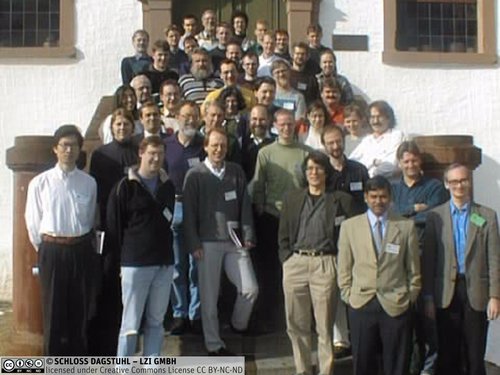Dagstuhl-Seminar 00071
Theory of Evolutionary Algorithms
( 13. Feb – 18. Feb, 2000 )
Permalink
Organisatoren
- D. Fogel (San Diego)
- H.-G. Beyer (Dortmund)
- I. Wegener (Dortmund)
- K. De Jong (Fairfax)
Kontakt
Evolutionary algorithms have a 45-year history dating back to some of the first efforts at John von Neumann's lab at Princeton in 1953. During the last ten years computers have become fast enough to support these algorithms and to allow applications to real-world problems. This has led to a great deal of empirical knowledge on the behaviour of evolutionary algorithms and to many heuristics for choosing their associated parameters.
Although evolutionary algorithms are easy to implement, the underlying process is a complicated and stochastic, depending on the fitness function and the free parameters controlling variation and selection. The analysis of these stochastic processing seems to be much more difficult than the analysis of randomised algorithms for special purposes, e.g., primality testing.
The aim of our workshop is to contribute to a theory of evolutionary algorithms. All aspects of analysis are of interest, including but not limited to fitness-distance correlations, fitness distributions, schema theory, progress rates, genetic repair principles, and models of evolution as stochastic processes.
The workshop has the aim to bring together researchers from all branches of evolutionary algorithms. Different points of view and different tools will be exchanged and we are hoping for synergistic effects of these discussions. For this reason not only computer scientists but also researchers form mathematics, physics, chemistry, and biology are invited.
Besides lectures on new results of the participants we plan to have an open problem session and plenty of time for informal discussions. This workshop style will be supported by the excellent facilities of Schloss Dagstuhl.
- D. Fogel (San Diego)
- H.-G. Beyer (Dortmund)
- I. Wegener (Dortmund)
- K. De Jong (Fairfax)
Verwandte Seminare
- Dagstuhl-Seminar 02031: Theory of Evolutionary Algorithms (2002-01-13 - 2002-01-18) (Details)
- Dagstuhl-Seminar 04081: Theory of Evolutionary Algorithms (2004-02-15 - 2004-02-20) (Details)
- Dagstuhl-Seminar 06061: Theory of Evolutionary Algorithms (2006-02-05 - 2006-02-10) (Details)
- Dagstuhl-Seminar 08051: Theory of Evolutionary Algorithms (2008-01-27 - 2008-02-01) (Details)
- Dagstuhl-Seminar 10361: Theory of Evolutionary Algorithms (2010-09-05 - 2010-09-10) (Details)
- Dagstuhl-Seminar 13271: Theory of Evolutionary Algorithms (2013-06-30 - 2013-07-05) (Details)
- Dagstuhl-Seminar 15211: Theory of Evolutionary Algorithms (2015-05-17 - 2015-05-22) (Details)
- Dagstuhl-Seminar 17191: Theory of Randomized Optimization Heuristics (2017-05-07 - 2017-05-12) (Details)
- Dagstuhl-Seminar 19431: Theory of Randomized Optimization Heuristics (2019-10-20 - 2019-10-25) (Details)
- Dagstuhl-Seminar 22081: Theory of Randomized Optimization Heuristics (2022-02-20 - 2022-02-25) (Details)
- Dagstuhl-Seminar 24271: Theory of Randomized Optimization Heuristics (2024-06-30 - 2024-07-05) (Details)
- Dagstuhl-Seminar 27291: Theory of Randomized Optimization Heuristics (2027-07-18 - 2027-07-23) (Details)


